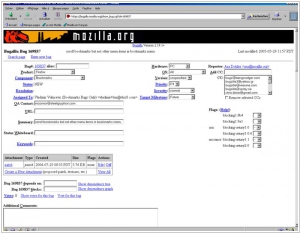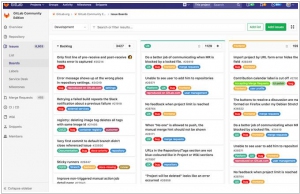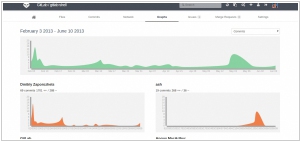Bugzilla vs Gitlab
May 19, 2023 | Author: Michael Stromann
10

Bugzilla is server software designed to help you manage software development. Bugzilla is a "Defect Tracking System" or "Bug-Tracking System". Defect Tracking Systems allow individual or groups of developers to keep track of outstanding bugs in their product effectively. Most alternative defect-tracking software vendors charge enormous licensing fees. Despite being "free", Bugzilla has many features its expensive counterparts lack. Consequently, Bugzilla has quickly become a favorite of thousands of organizations across the globe.
14

GitLab offers git repository management, code reviews, issue tracking, activity feeds and wiki’s. Enterprises install GitLab on-premise and connect it with LDAP and Active Directory servers for secure authentication and authorization. A single GitLab server can handle more than 25,000 users but it is also possible to create a high availability setup with a multiple active servers.
Bugzilla and GitLab are both software development tools but serve different purposes in the development lifecycle.
Bugzilla is a widely used bug tracking system that focuses on managing and tracking software issues, defects, and feature requests. It provides a centralized platform for teams to report, track, and resolve bugs, assign tasks, and collaborate on issue resolution. Bugzilla offers robust features for bug triaging, customizable workflows, and detailed reporting, making it suitable for teams dedicated to bug management and issue tracking.
On the other hand, GitLab is a comprehensive DevOps platform that includes version control, continuous integration and deployment, issue tracking, and project management capabilities. While GitLab does have built-in issue tracking functionality, its primary focus is on source code management and collaboration. It provides a centralized repository for managing and versioning code, enabling teams to work together on code changes, merge requests, and code reviews.
See also: Top 10 Issue Trackers
Bugzilla is a widely used bug tracking system that focuses on managing and tracking software issues, defects, and feature requests. It provides a centralized platform for teams to report, track, and resolve bugs, assign tasks, and collaborate on issue resolution. Bugzilla offers robust features for bug triaging, customizable workflows, and detailed reporting, making it suitable for teams dedicated to bug management and issue tracking.
On the other hand, GitLab is a comprehensive DevOps platform that includes version control, continuous integration and deployment, issue tracking, and project management capabilities. While GitLab does have built-in issue tracking functionality, its primary focus is on source code management and collaboration. It provides a centralized repository for managing and versioning code, enabling teams to work together on code changes, merge requests, and code reviews.
See also: Top 10 Issue Trackers
Bugzilla vs Gitlab in our news:
2015. Collaboration platform for developers GitLab raises $4M

GitLab, the open source Git-based collaboration platform for developers, has announced that it successfully secured $4 million in Series A funding. The company provides a free community edition, a free SaaS version, and a paid enterprise edition of its service. With the newly acquired funding, GitLab aims to expedite its growth and expand its global operations. Git has become the go-to method for code management among numerous development teams. While GitHub stands as the most well-known Git-hosting service, there exist several competitors in this realm, each offering their own unique approach and user interface on top of the fundamental hosted Git concept. Atlassian, for instance, provides both free and paid Git hosting services. What sets GitLab apart from some of these competitors is its strong emphasis on its open source solution.
2011. Bugzilla 4.0 improves duplicate detection, custom fields and search
The latest version of the widely-used bug-tracker, Bugzilla 4.0, has been officially released. Since Bugzilla 3.0, significant redesigns have been implemented across almost every major user interface, resulting in a vastly improved experience. Additionally, the WebServices have undergone significant advancements, and an impressive Extensions system has been introduced, accompanied by numerous other new features. Bugzilla 4.0 introduces more than just enhanced WebService and UI functionality. Exciting additions include automatic duplicate detection, improved custom field capabilities, autocomplete functionality for user inputs, and search enhancements. Furthermore, the update brings forth a new attachment details user interface, general usability improvements, a revamped default status workflow, improved "Last Search" functionality that remembers multiple searches, cross-domain WebServices with JSONP support, mandatory custom fields, the transformation of voting into an extension, automatic provision of new CSS and Javascript to users, an array of new hooks, and a new Apache configuration.


